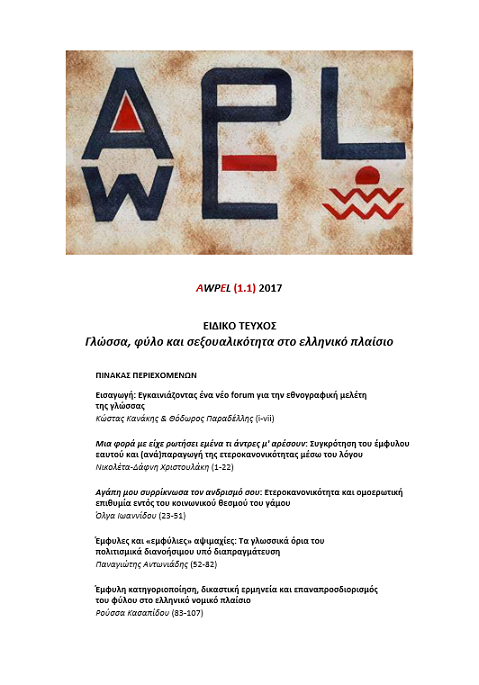Αγάπη μου συρρίκνωσα τον ανδρισμό σου: Ετεροκανονικότητα και ομοερωτική επιθυμία εντός του κοινωνικού θεσμού του γάμου
Abstract
This paper investigates the dialectical relationship between language, gender and sexuality and the way it is realized in discourse production based on data collected from interaction within a community of practice. The goal is to highlight how discourse indexes both gender and sexuality, while, at the same time, a “coming out” event –taking place in a social institution such as marriage– subverts heteronormal presuppositions. The four interlocutors (men and women) perform their gendered and sexual self, revealing –each one of them– features of their identity intermediated not only by language and identity but by heteronormative ideologies of the contemporary Greek reality. Depending on the situation, the particular individuals do not hesitate either to react to anything that offends the normality of that reality or to defend the dynamics of the desire that determines the fluidity of their own sexuality.
Article Details
- How to Cite
-
Ιωαννίδου Ό. (2017). Αγάπη μου συρρίκνωσα τον ανδρισμό σου: Ετεροκανονικότητα και ομοερωτική επιθυμία εντός του κοινωνικού θεσμού του γάμου. Aegean Working Papers in Ethnographic Linguistics, 1(1), 23–51. https://doi.org/10.12681/awpel.14417
- Section
- Articles

This work is licensed under a Creative Commons Attribution 4.0 International License.
Authors who publish with this journal agree to the following terms:
Authors retain copyright and grant the journal right of first publication with the work simultaneously licensed under a Creative Commons Attribution licence that allows others to share the work with an acknowledgement of the work's authorship and initial publication in this journal.
Authors are able to enter into separate, additional contractual arrangements for the non-exclusive distribution of the journal's published version of the work (e.g. post it to an institutional repository or publish it in a book), with an acknowledgement of its initial publication in this journal.
Authors are permitted and encouraged to post their work online (preferably in institutional repositories or on their website) prior to and during the submission process, as it can lead to productive exchanges, as well as earlier and greater citation of published work (See The Effect of Open Access).



